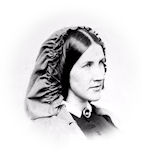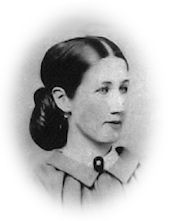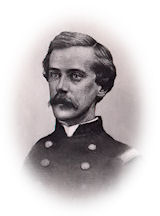 From Eliza’s Journal.
From Eliza’s Journal.
S. S. Daniel Webster.
Just before sunset, last night, we passed the mouth of the York River, and could see our gunboats and a fleet of some four hundred sloops and schooners lying a little way up it—among them our fleet, Franklin’s Division, still lying off Ship Point. We made our way in among them and dropped anchor just off the Point within a stone’s throw of the rebel barracks, now used as a hospital for our men. After dark we could see the lights of the fleet all around us like the lamps of a great city on the shores of a harbor, and these, with the camp-fires on shore lighting up the horizon, and the little row-boats darting about, dashing up phosphorescence at every stroke of the oar, made the scene a magical one; while the bugle calls and regimental bands on the different boats increased the effect. Joe’s boat, the Daniel Webster No. 2, lies further away from us up towards Cheese-man’s Creek. . . .
![]()
 Georgeanna’s Journal.
Georgeanna’s Journal.
Next morning Mr. Olmsted hailed the steamer which carried the 16th New York, to “let the Colonel know that his wife was on board among the nurses.” He received an acknowledgment from the Colonel in the form of a check for one thousand dollars for the Sanitary Commission, and what was still better, Mr. O. said, a note of hearty appreciation of the Commission’s work for the soldiers. Joe soon came over to the steamer himself, and Lenox Hodge, who was with a Philadelphia detail of surgeons on the steamer Commodore, also came on board.





